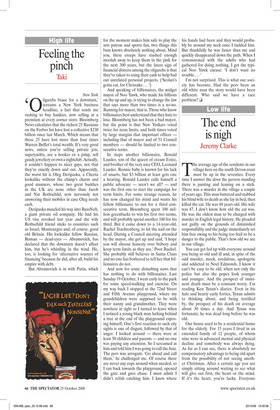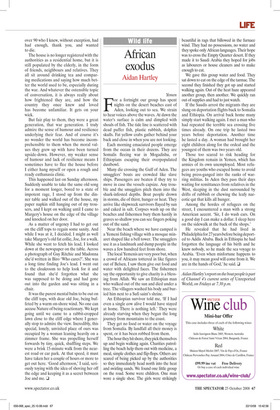The end is nigh
Jeremy Clarke
The average age of the residents in our village here on the south Devon coast must be up in the seventies. Every time I answer the door the person standing there is panting and leaning on a stick. There was a murder in the village a couple of years ago. This man battered and stabbed his blind wife to death as she lay in bed, then killed the cat. He was 88 years old. His wife was 87. I don’t know how old the cat was. He was the oldest man to be charged with murder in English legal history. He pleaded not guilty on the grounds of diminished responsibility and the judge immediately set him free owing to his being too frail to be a danger to the public. That’s how old we are in our village.
You can get fed up with everyone around you being so old and ill and, in spite of the odd murder, meek, credulous, apologetic and addicted to Noel Edmonds. I know it can’t be easy to be old, when not only the police but also the popes look younger and younger. And the prospect of imminent death must be a constant worry. I’m reading Ken Tynan’s diaries. Even in his hale and hearty early forties, Tynan admits to thinking about, and being terrified by, the prospect of his death on average about 30 times a day. And Tynan was fortunate; he was dead long before he was old.
Our house used to be a residential home for the elderly. For 15 years I lived in an extended family of 12 people, of whom nine were in advanced mental and physical decline and somebody was always dying. As far as I can see, there is absolutely no compensatory advantage to being old apart from the possibility of not seeing another Christmas. After a certain age you are simply sitting around waiting to see what will give out first, the heart or the mind. If it’s the heart, you’re lucky. Everyone over 90 who I knew, without exception, had had enough, thank you, and wanted to die.
The house is no longer registered with the authorities as a residential home, but it is still populated by the elderly, in the form of friends, neighbours and relatives. They all sit around drinking tea and comparing medications and saying how much better the world used to be, especially during the war. And whatever the ostensible topic of conversation, it is always really about how frightened they are, and how the country they once knew and loved has become unfamiliar. It gets on your wick.
But fair play to them, they were a great generation, that war generation. I truly admire the sense of humour and resilience underlying their fear. And of course it’s no wonder the world has become incomprehensible to them when the moral values they grew up with have been turned upside-down. However, my weaker sense of humour and lack of resilience means I sometimes have to flee the house before I either hang myself or open a rough and ready euthanasia clinic.
This happened last on Sunday afternoon. Suddenly unable to take the same old song for a moment longer, bored to a state of impotent rage, I stood up from the dinner table and walked out of the house, my paper napkin still hanging out of my trousers, and I kept on walking until I came to Margery’s house on the edge of the village and knocked on her door.
As a matter of urgency I had to get out on the cliff tops to regain some sanity. And while I was at it, I decided, I might as well take Margery’s old fat collie, Joe, for a walk. While she went to fetch his lead, I looked down at the newspaper on the table. Across a photograph of Guy Ritchie and Madonna she’d written in Biro ‘Who cares?’. She was a long time finding Joe’s lead. I went out to the cloakroom to help look for it and found that she’d forgotten what she was supposed to be doing and had gone out into the garden and was sitting in a chair.
It was the purest mental balm to be out on the cliff tops, with dear old Joe, being buffeted by a warm on-shore wind. No one can accuse Nature of being reactionary. We kept going until we came to a rabbit-cropped lawn close to the cliff edge where I generally stop to admire the view. Incredibly, this special, lonely, unvisited place of ours was occupied by a woman leaning heavily on a zimmer frame. She was propelling herself forwards by tiny, quick, shuffling steps. We were a brisk 15-minute walk from the nearest road or car park. At that speed, it must have taken her a couple of hours or more to get out here. ‘Good afternoon,’ I said, seriously toying with the idea of shoving her off the edge and keeping it as a secret between Joe and me. ❑



















































































 Previous page
Previous page